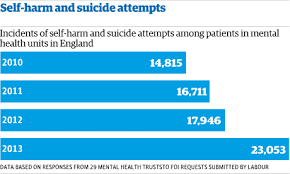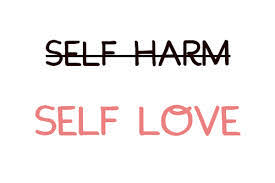Self harm
Understanding self-harm
Self-harm can cover a range of things that people do to themselves in a deliberate and harmful way. Although cutting is the most common form of self- harm, other methods include head banging, hair pulling, burning and scalding, biting, scratching, stabbing, breaking bones, swallowing objects, self-poisoning and overdosing.
By injuring themselves, children and young people are asserting a form of self- control on their life which they feel is otherwise chaotic and meaningless. Self-harm is a way of coping and of channelling frustration and other strong emotions. In the vast majority of cases, it is not a suicide attempt, but rather a way to let off steam.
Apart from the physical symptoms of self-harm, there are other clues to watch out for if you are concerned about your child. Your child may seem very down and talk about being a failure or feeling unhappy. They may take to wearing many layers of clothes, or trying to hide or downplay injuries. Eating disorders and disrupted sleep patterns are both seen to be linked to self-harming.
The urge to self-harm can be very hard to resist and can become addictive. To recover and move forward, it is necessary to gain an understanding of the behaviour and develop coping strategies to help deal with the situations and emotions that lead to self-harm.
Self-harm is not a form of attention-seeking. People who self -harm tend to do so in private and try their utmost to conceal their injuries. Neither do they self-harm to look cool or fit in with their peer group. Self-harm is a repeated reaction to emotional pain and distress and this continuous behaviour is an indication of an underlying problem. With the right help and support you can help your child to come through this, and your relationship with them may even improve as a result. Parents worried about self-harm ask us: 'I don't understand. Why would my child do such a terrible thing?'.
“Have you ever felt so angry, so frustrated, that you want to slam your hand on a desk or kick something across the room?” asks Caroline Roe of Harmless, a self-help group that focuses on recovery. “That’s what self-harming is like - a surge of frustration that snaps into an action.
“When people understand this, they can relate easier to self harm.” Self-harming is not a mental illness – rather, it’s a means of coping with difficult emotions and feelings.
“Self-harm is always a coping strategy,” says Caroline. “A person who is self-harming is trying to influence what is going on inside. If they don’t have a language for what’s going on, they don’t know how to tolerate what they are feeling. Part of the recovery is learning to express themselves, ask for help and communicate what they are feeling. By doing that they gradually reduce the need to self harm.”
“Discovering your child is self-harming is shocking for a parent,” agrees Wedge, founder of First Signs a voluntary organisation run by people with experience of self injury. Parents may also feel confused, angry, betrayed and even repulsed.
Hard as it might be, parents need to put their own feelings to one side and concentrate on the reasons behind their child’s self-harm rather than the self-harm itself.
“It is normal to have real fears for your child. But the key is to open up communication and build trust so your child can talk to you about these underlying issues.”

I think my child might be self-harming. How do I bring up the subject?
“First work on improving your relationship,” says Wedge. “Take time out once a week to sit down together and generally chat about what’s good and bad in their life. You can start with: ‘What did you learn at school today? Who did you spend time with?’ If your child gives one-word answers, try a different environment. Go out somewhere together for a chat. You don’t have to raise self-injury in the first conversation but you could raise it in the 14th. The child might say something to which you can gently ask ‘...is that why you’ve been hurting yourself?’ You can ask rather than accuse."
'I've begged them to stop and hidden anything sharp. But they're still hurting themselves.’
“Your child cannot stop self-harming just because you want them to,” says Wedge. “Self injury isn’t something you can stop because of will power or because you have made a decision. Nor is it a cry for help or attention- seeking.
“Your child is having trouble dealing with emotions and, for now, this is the only way they can deal with them.”
In fact, trying to physically restrain your child or prevent them from harming is the worst thing you can do, says Caroline Roe: “If a young person feels they are being prevented from doing what they need to do, it can drive the behaviour underground so they are less likely to seek help - or they are likely to feel more out of control. And when they feel out of control they are more likely to harm themselves in a worse way.
“But that doesn’t mean you have to put up with anything and you certainly don’t have to accept or approve their self-harming. But what you can say is this: ‘OK, we accept that this is where you are now. Let’s see how we can help you move forward’. There can be clear boundaries put in place – where the child agrees to keep talking to the parent and seek help.”

‘I’m terrified that my child will really hurt - or even kill themselves - by self harming.’
This is the most common fear expressed by parents who contact Family Lives. But experts and parents who have been through it say most self-harmers know exactly what they are doing and how far they need to go to find release/relief from their problems. However, the very nature of self-harming means that there is a risk that the child may go too far – and accidentally cause more harm than intended.
While the majority of scratches and bruises can be dealt with in a first- aid type manner any serious injuries or anything to do with heat or medicines should get prompt medical attention and a discussion with the young person about the physical nature of the self injury.
Is my child suicidal?
This is another huge worry for parents. But experts stress there is a distinct difference between self harming and suicide. “People who self-harm hurt themselves as a way of coping with life - not ending it,” says Caroline Roe.
Self-harm is the symptom, not the cause. There is always something else wrong.

What should I do if my child comes to me with an injury?
Stay calm and don’t over-react. Jane, a parent who has cared for a child who self-harmed, says: “Your child isn’t trying to kill themselves but they’re scared, so don’t add to it.” Sit them down and treat the wound, or seek medical attention, if necessary. You don’t even have to comment on the fact that it’s happened. Don’t try to extract information or put pressure on them to talk to you. When they are ready they will come to you and talk.”
Reassure you child. “Tell them you love them unconditionally, you're there to support them and you will get through this,” says Wedge. “You can say: 'I don’t know what to do or say but I'm worried about you - we need to seek help.'
What can I do to help a child who is self harming?
“Parents can make a massive difference very quickly,” says Caroline Roe. “I can work with a parent for just one hour and change their perspective radically. We try and say: ‘Let's take the focus off self-harm.' The problem isn’t the self-harm. The problem is that someone is distressed enough to do that in the first place.
“We encourage parents to not take the self-harming personally, not respond with anger and frustration but to enquire how the young person is feeling."
Wedge says: “Keep talking. Instead of asking: ‘Have you hurt yourself today?’ ask: ‘How are you feeling?’ Take the self-harm out of the equation.”
Parents have to accept that their child might not want to talk to them about it and may never give an explanation.
“All you can do is assure them your love is unconditional,” says Wedge. “If they can’t talk to you, help them find someone they can talk to.”
However, if your child does confide, don't dismiss or trivialise their worries.
“It’s important that however bad parents think things are, they are hopeful of change,” says Caroline. “Believe and keep believing in your child’s capacity to overcome it. Then they’ll feel that too. That sounds clichéd but it makes a big difference. The biggest thing that people who self harm say they want to hear is ‘it’ll be ok.'"

Further support
Harmless - is a national voluntary organisation for people who self harm, their friends, families and professionals
National Self Harm Network - supports individuals who self harm to reduce emotional distress and to improve their quality of life and support and provide information for family and carers of individuals who self harm
The Bristol Crisis Service for Women is a national organisation to support girls and women in emotional distress, and specialises in self harming.
This article is taken from Familylives.org
We think this news story will be of interest to our visitors. However, please note it is from another source and does not necessarily represent the views of Oxondads. If you would like to comment on this article please click on the "No Comments" below or alternatively E-Mail info@oxondads.co.uk

No comments:
Post a Comment